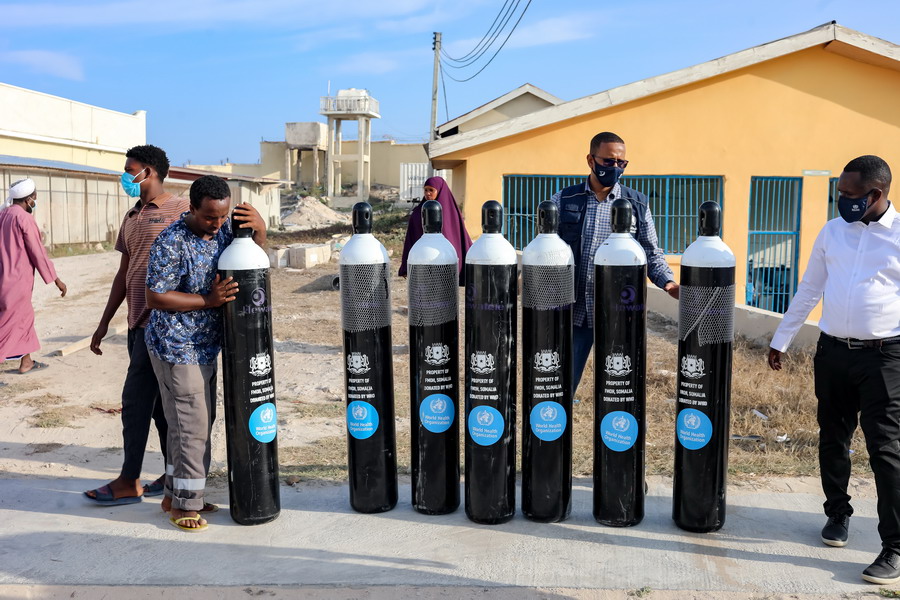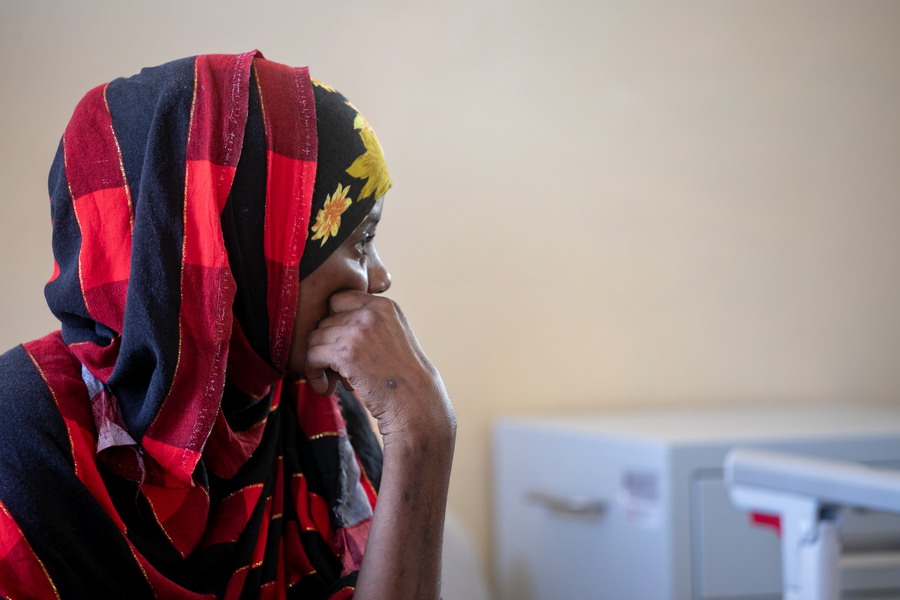To meet urgent, unmet needs, WHO Somalia donated 200 lifesaving, re-fillable oxygen cylinders to the De Martino Hospital

26 April 2021 - In the last year, while traders worldwide watched as commodities’ prices rose and crashed, one precious commodity that soared in demand and value is medical oxygen. As the Federal Ministry of Health and Human Service (FMoH)’s National Incident Manager for the coronavirus disease (COVID-19) response in Somalia, and Director of one of the busiest hospitals in Somalia – the De Martino Hospital – Dr Abdirizak Yusuf Ahmed knows the importance of medical oxygen.
After being through a year of planning, preparing, coordinating and putting up a brave front against COVID-19, his worst nightmare came true during one long, bleak night. Somalia was facing its second wave of COVID-19, and on 2 March 2021, Dr Abdirizak and his team of doctors had to work tirelessly around the clock, struggling to keep infected patients alive. That evening, all 25 beds in the intensive care unit (ICU) were occupied, and 70 Somalis were in need of oxygen. This was at a time when the country was facing a more severe wave of the COVID-19 pandemic compared to the one in 2020, causing a more devastating and heavier toll on lives and people than had been seen in 2020.
“We ran out of medical oxygen,” he says, remembering all the details. “At midnight, there were already many cases, but more and more sick people kept pouring in. Most of them needed supplemental oxygen therapy. We tried every method possible to give them oxygen. At some point, we were even using Ambu bags and masks.”
He recalls how he worked hard to keep a 16-year-old boy who had another chronic problem alive, but it was a real struggle. They lost 8 people that night. But then, almost as though a miracle knocked at their hospital door, the very next day a team of 3 technical experts from WHO arrived at 2 pm with 200 oxygen cylinders and 50 medical oxygen regulators.
Dr Abdirizak felt like someone had lifted a boulder off his shoulders. He was moved to see people, who had very little hope 12 hours before then, survive and leave the hospital to rush back to their loved ones.
Lives lost due to lack of oxygen
According to the Lancet, a press release issued by Wellcome Trust, Unitaid, and WHO, who have set up a COVID-19 Oxygen Emergency Taskforce, stated that more than half a million patients with COVID-19 in low- and middle- income countries need oxygen therapy every day and shortages are causing preventable deaths. This figure excludes the millions of patients, including newborn babies and children with pneumonia, malaria, and other ailments, who also require medical oxygen therapy each year.
In February 2021, the De Martino Hospital recorded a total of 104 deaths and 163 admissions due to COVID-19. The COVID-19 Oxygen Needs Tracker, available at https://www.path.org/programs/market-dynamics/covid-19-oxygen-needs-tracker/ and managed by PATH, a global nonprofit organization improving global health, estimated that during February, when the cases spiked, the daily oxygen need in Somalia also surged to 7000 cubic metres a day (1000 oxygen cylinders).
After noting the dire situation and growing numbers of cases and increased trend of deaths due to COVID-19, exacerbated by the lack of access to medical oxygen, HE Dr Fawziya Abikar Nur, the Minister of Health and Human Services of the Federal Government of Somalia, called for an urgent meeting on 11 February 2021 with Dr Mamunur Malik, the WHO Representative for Somalia and the WHO Incident Management Support Team (IMST). She described the dire need for medical oxygen and appealed for immediate support. Gauging the critical nature of the situation, the WHO technical team identified the shortage of oxygen cylinders as a bottleneck and agreed to procure 200 units of medical oxygen cylinders and 50 medical oxygen regulators with humidifiers to meet the growing demand for medical oxygen in the hospital.
Empowering hospitals with sustainable solutions
“While responding to the COVID-19 crisis, WHO is working to rebuild health systems in Somalia. In other words, while we provided oxygen cylinders, we are also making sure that the health care workers are adequately trained on their use, not only for COVID-19, but for other medical conditions too,” explains Dr Mamunur Rahman Malik, WHO Representative for Somalia. “In fact, from December to March, with funding from the World Bank, WHO Somalia collaborated with international partners and the teams in the Eastern Mediterranean Regional Office and Headquarters to train clinicians in basic emergency care and management of patients in intensive care units- one component of which was how to use oxygen concentrators. The provision of oxygen is one of the interventions we are using to help patients breath normally and survive after being severely infected with COVID-19. This will help health facilities and communities in the long run too, as we are meeting unmet needs of patients suffering from pneumonia and other diseases, who need oxygen to survive.”

“As soon as we received the request from the Federal Government of Somalia, our procurement team contacted local and regional suppliers. A tremendous coordinated logistics effort followed to drive the empty oxygen cylinders across the country from the supplier’s warehouse to Nairobi’s international airport, and packaging, airlifting them to Mogadishu in batches. We procured and shipped the oxygen cylinders from Kenya, as no one could supply them fast enough in Somalia,” said Dr Shajib Hossain, Medical Operations Lead, WHO IMST in Somalia, who also serves as WHO Somalia’s Planning Officer. “On 3 March, we handed over 200 oxygen cylinders and 50 medical oxygen regulators with humidifiers to the De Martino Hospital. Additionally, to fill in the gap until the FMoH takes charge of the operations, WHO has reached a service-level agreement with a local company in Mogadishu, Ugas Production, to ensure the regular refilling of the oxygen cylinders.”
“We were able to respond swiftly and procure oxygen cylinders and with the arrangement for daily refilling with generous support from our partner, the European Union Delegation to Somalia. We remain grateful to them for their kind and timely support to Somali communities,” added Dr Malik.
Dr Abdirizak, a father of four, who is an infectious disease specialist and public health expert, is giving this fight his all. He knows the pain some families are feeling – he lost his father to COVID-19 in April 2020, when the disease was still new to the world and Somalia.
“Things were tough before the oxygen arrived, as we were using 200 oxygen cylinders a day. Some of the critical patients were using one cylinder every two hours,” adds Dr Abdirizak. “At the De Martino Hospital, we are so grateful to WHO and their partners, not only for oxygen but also for the technical support they have given us to manage the oxygen cylinders. We have reached a stage where we can stand on our feet – we know how to measure oxygen levels and use the cylinders. WHO also helped us setting up a supply, consumption system for the oxygen cylinders in close coordination with a local company to refill the cylinders. As our hospital provides free services, we get so many patients – we are thankful we can actually help the severe cases now.”
WHO was able to procure and provide 200 oxygen cylinders and 50 medical oxygen regulators with humidifiers to the De Martino hospital in Mogadishu with financial support received from the European Union Delegation to Somalia.




